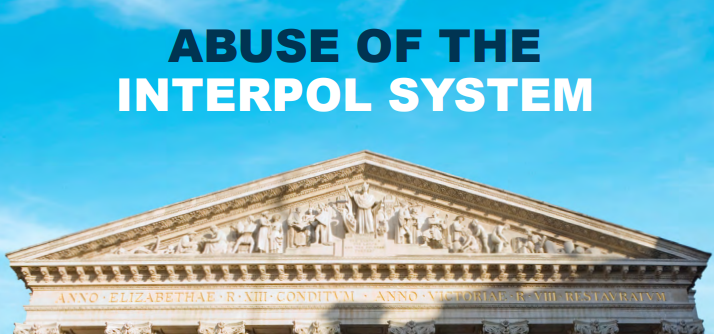Knowledge Hub
Join the Conversation!
Impartial and independent, ThoughtLeaders4 Private Client Knowledge Hub hosts cutting edge industry content and insight.
Email maddi@thoughtleaders4.com to submit content.
Abuse of the Interpol system
Date: 15/07/2020 Type: Articles Topic: Private Client | Next Generation Wealth |The COVID-19 pandemic has forced the planet to grind to a halt and will have a lasting economic impact. Whilst the severity of this impact remains to be seen, we know from previous economic downturns that well-connected elites in high risk jurisdictions have often used improper methods to recoup their personal losses.
Less politically well-connected high-net worth individuals, particularly those in high risk jurisdictions, may find themselves targeted for wealth extraction by way of corporate raiding.
In countries where there is a less robust rule of law than the UK, the state itself or rather some corrupt members of establishments, have been known to falsify criminal accusations against wealthy individuals. The subsequent damage to the individual’s reputation is often sufficient to cause an individual to quietly settle a matter and transfer requested assets.
For those who will not be coerced, one particularly useful mechanism for corrupt state officials to utilise is the Interpol Red Notice. It subjects targets to immense psychological pressure and prevents them from travelling internationally for fear of arrest at the border.
Red Notices are intended as a mechanism for tracing and pursuing bona fide criminals. When used properly, Red Notices are a crucial aspect of Interpol’s system of international police cooperation, because they allow its 194 member countries to coordinate in tackling transnational crime, cybercrime and terrorism.
The use of Red Notices to serve political ends, including corporate raiding, is expressly prohibited by Article 3 of Interpol’s Constitution, which states that ‘it is strictly forbidden for the Organization to undertake any intervention or activities of a political, military, religious or racial character’. Despite this, there is a body of evidence indicating that certain repressive regimes abuse Interpol’s system to attack political opponents and vulnerable high-net worth individuals, notably Russia, China, Turkey, and Venezuela.
Perhaps the most prominent example of this attempted abuse of Interpol relates to William Browder. Browder was on the receiving end of an alleged corporate raid by the Russian state when he was expelled from Russia in 2005 and his company, The Hermitage Fund, was targeted. His tax adviser, Sergei Magnitsky, testified that the Russian police and tax authorities had attempted to steal $230 million in Russian taxes. Magnitsky was arrested and died in detention. Since this point Russia has filed a Red Notice request against Browder seven times requesting his arrest.
He live-tweeted his arrest in Spain by Spanish police responding to a Russian Red Notice in 2018.
Within a few hours he was released, but only because the General Secretary in Lyon advised them not to honour the new Russian Interpol Red Notice.
Each member country decides what legal value to give a Red Notice. Red Notices are not always published on Interpol’s website. Therefore, you may not know that you are subject to a Red Notice until you are arrested.
Due to external pressure from states and NGOs, Interpol recognised some of its deficiencies and attempted to combat vague and politically motivated notices. Between 2015 and 2017, Interpol welcomed a raft of changes and reforms that were intended to make their systems more resistant to abuse. In 2015, a refugee policy was adopted that alerted Interpol if the target of a Red Notice had refugee status, due to seeking asylum from the country where the Notice originated.
The following year, a new Red Notice review ensured that all Red Notice alerts were subjected to more detailed scrutiny by a specialist team that specialise in upholding Interpol's constitution, before circulation. Interpol has also been required to change its frameworks in line with EU data protection law. Individuals subjected to Red Notices can make applications before national courts or directly to the CCF (an independent body of Interpol) to request correction or deletion of the data held by Interpol.
Despite these well-intentioned changes more is required to prevent abuse of Interpol. In 2017, German Chancellor Angela Merkel publicly denounced Turkey’s abuse of Interpol in the wake of the 2016 coup. Turkey had uploaded thousands of passport numbers into Interpol’s stolen-passport database, in an attempt to track and catch dissidents. Another method for circumventing the management of Red Notices is to use the slightly less high profile ‘Diffusion’, which acts as an informal request for cooperation from the country.
A prime example of this is Nikita Kulachenkov, a forensic accountant who was an associate of Alexei Navalny, the Russian political activist and lawyer. A Diffusion was placed against him in August 2015. His ‘crime’ was the theft of a street-art drawing valued at just $1.55. He was arrested in Cyprus in January 2016. This arrest came about despite Kulachenkov warning Interpol in 2014 that he may be subject to a Notice from Russia. Had Russia attempted to use a Red Notice to seek Kulachenkov’s arrest, it is more likely that Interpol would have identified the request as abusive, but the use of a Diffusion avoided the flag. For those that are victims of the system and targeted by malign countries, it can be psychologically and financially life destroying. Browder is quoted in saying that Russia’s use of Interpol is “a perfect way for Putin to basically breathe the fear of God into all of his enemies”.
For this reason, some member states are taking active steps to combat the abuse of Interpol. The Transnational Repression Accountability and Prevention (TRAP) Act of 2019 is a piece of legislation in the USA that was introduced to the House and Senate in September 2019 – albeit, at the time of writing, not yet passed into law. It is a bipartisan response to the concern over the abuse of Interpol by authoritarian states to repress individuals transnationally. The TRAP Act assumes that if Interpol does not introduce penalties on violators the abuse will continue. The Act seeks to require Interpol to act within its own rules to “impose penalties on countries for regular or egregious violations” of its constitution. It does this by requiring the US to use its “voice, vote, and influence” to push for greater transparency.
The TRAP Act has an impact on the weight of Interpol Notices in the US. It clearly acknowledges the reality of Interpol abuse, which will be particularly important to lawyers fighting these sorts of cases.
What is truly baffling is that the UK is taking a comparative backward step in response to the continued scrutiny of the global abuse of Interpol. The UK government has proposed the implementation of a new policy, which will empower police to arrest anyone listed with a Red Notice on Interpol’s database, without first obtaining a domestic arrest warrant by a British magistrate.
We should instead be following the example set by the TRAP Act and be pushing for reprimands to authoritarian regimes for abuse of the system for political gain. Britain’s policy towards Russia should be one of deep suspicion – see our Egorova & Others article here – instead they, along with other regimes, are permitted to use Interpol to their political advantage. As human rights lawyers, with experience with corporate raiding matters, we can submit applications to remove Red Notices, which requires written arguments and evidence. We would also recommend making a subject access request to Interpol before demanding the deletion of information. This makes the process longer, but it may provide information that can be used as a point of argument in submissions.
The granting of asylum is also an extremely persuasive form of protection from political persecution by a state using Interpol as a conduit.
Author
Matt Ingham, Richard Milford & Isaac Ricca-Richardson – Payne Hicks Beach
Our Private Client Corporate Partners




























